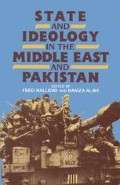Abstract
There is a pervasive belief, held more widely outside Pakistan than in the country, that Pakistan, with Israel and Iran, is one of three confessional states in the world; that, like Israel, its very origin was to fulfil a religious ideal, to create an Islamic state and Islamic society for Muslims of India. That has been the slogan of the Jamaat-e-Islami, the fundamentalist extreme right-wing party, since Pakistan was created. Interestingly enough it was not their slogan before the creation of Pakistan, for they had opposed the Pakistan movement. The regime of General Zia has declared likewise, that Pakistan was created to establish an Islamic state for Muslims of India. Lacking a popular mandate the military regime has sought its claim to legitimacy, if not its purpose, in divine ordinance.
Preview
Unable to display preview. Download preview PDF.
Notes
See Ram Gopal, Indian Muslim. (London, 1959), ch. 11
for an Indian nationalist view, and R. Palme Dutt, India Toda. (Bombay, 1970), pp. 456–9
D. N. Pritt ‘India’, in Labour Monthl., XXIV (April 1942), for the Communist view.
This view was reiterated by R. Palme Dutt, ‘India and Pakistan’, in Labour Monthl., XXVIII (March 1946).
G. Adhikari, Pakistan and Indian National Unit. (Bombay, 1943)
R. Palme Dutt, ‘Notes of the Month’, Labour Monthl., XXIV (September 1942).
Edward Mortimer, Faith and Power: The Politics of Isla. (London, 1982).
H. A. Alavi, ‘The State in Post-Colonial Societies’, New Left Review 7. July-August 1972
reprinted in Kathleen Gough and H. Sharma (eds), Imperialism and Revolution in South Asi. (1973)
and in H. Goulbourne, Politics and the State in the Third Worl. (London, 1979).
B. T. McCully, English Education and the Origins of Indian Nationalis. (Williamsburg, 1940)
Aparna Basu, The Growth of Education and Political Development in India 1897–192. (Delhi, 1974).
Francis Robinson, Separatism Among Indian Muslims: The Politics of the UP Muslims 1860–192. (Cambridge, 1974), p. 46.
For an analysis of the role of the bureaucratic-military oligarchy in Pakistan see Hamza Alavi, ‘Class and State in Pakistan’, in H. N. Gardezi and J. Rashid (eds), Pakistan: The Roots of Dictatorship: The Political Economy of a Praetorian Stat. (London, 1983). Within the bureaucratic-military oligarchy, the military emerged as the senior partner by the 1970s and the coherence of the once tightly-knit bureaucracy, controlled by the CSP cadres, has been largely undermined. Punjabis dominate both the military as well as the civil bureaucracy.
Abdul Hamid, Muslim Separatism in Indi. (Lahore, 1967).
McKim Marriott, Caste Ranking and Community Structure in Five Regions of India and Pakista. (Poona, 1960).
Zia-ul-Hassan Faruqi, The Deoband School and the Demand fo. Pakista. (London, 1963)
Barbara Metcalf, Islamic Revival in British India: Deoband 1860–190. (Princeton, 1982), passim.
David Gilmartin, ‘Religious Leadership and the Pakistan Movement in the Punjab’, in Modern Asian Studie., vol. XIII, No. 3 (1979)
Barbara Metcalf (ed.), Moral Conduct and Authorit. (London, 1984)-articles by David Gilmartin and Richard Eaton.
For an account of political factions dominated by landlords and pirs, see Hamza Alavi, ‘Politics of Dependence: A Village in West Punjab’, South Asian Revie., vol. IV, no. 4 (January 1971).
Iftikhar Ahmad, Pakistan General Elections 197. (Lahore, 1976).
Clarence Maloney, Peoples of South Asi. (New York, 1974), p. 506.
David Kopf, The Brahmo Samaj and the Shaping of the Modern Indian Min. (Princeton, 1979).
Christian W. Troll, Sayyid Ahmad Khan: A Reinterpretation of Muslim Theolog. (Karachi, 1979), p. 18 and n. 75.
Sir Syed Ahmad Khan, Rah-e-Sunnat dar Radd-e-Bid’at, Tasanif-e-Ahmadiy. vol. I (Aligarh, 1883).
Mohammad Iqbal, The Reconstruction of Religious Thought in Isla. (Lahore, 1958 reprint).
K. K. Aziz, Party Politics in Pakistan 1947–5. (Islamabad, 1976), pp. 143–4.
Azim Husain, Fazl-i-Husain: A Political Biograph. (Bombay, 1946), pp. 315–16.
Mohammad Iqbal, Letters of Iqbal to Jinna. (Lahore, 1963), pp. 28–32.
Dow to Wavell, 20 September 1945, Fortnightly Reports-Sind, L/P & J/5–26., Jan.-Dec. 1945, India Office Records.
Jamil-ud-Din Ahmad (ed.), Speeches and Writings of Mr. Jinna., vol. 1 (6th edition, Lahore, 1960), p. 43.
Ayesha Jalal, The Sole Spokesman: Jinnah, Muslim League and the Demand for Pakista. (Cambridge, 1985), pp. 95–6.
G. W. Choudhury (ed.), Documents and Speeches on the Constitution of Pakista. (Dacca, 1967), pp. 21–2.
E. I. J. Rosenthal, Islam and the Modern National Stat. (Cambridge, 1965), p. 245.
S. Sibte Hassan, Naveed-e-Fik., (Urdu) (Karachi, 1983).
Rounaq Jehan, Pakistan: A Failure in National Integratio. (London, 1972), pp. 25–7.
Editor information
Editors and Affiliations
Copyright information
© 1988 Hamza Alavi
About this chapter
Cite this chapter
Alavi, H. (1988). Pakistan and Islam: Ethnicity and Ideology. In: Halliday, F., Alavi, H. (eds) State and Ideology in the Middle East and Pakistan. Palgrave, London. https://doi.org/10.1007/978-1-349-19029-4_4
Download citation
DOI: https://doi.org/10.1007/978-1-349-19029-4_4
Publisher Name: Palgrave, London
Print ISBN: 978-0-333-38308-7
Online ISBN: 978-1-349-19029-4
eBook Packages: Palgrave Social & Cultural Studies CollectionSocial Sciences (R0)

